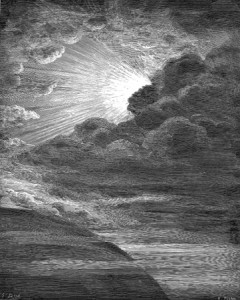Anthology Poet Highlight 28/82: Danny Nelson, “Creation”
Danny’s “Creation” revises the Old Testament’s opening text. As such, it delves deeply into the “procreant urge of creation,” a phrase straight out of Whitman. Indeed, in Danny’s poem, as in Whitman and, I would argue, most poetry, I find this “Urge and urge and urge, / Always the procreant urge of the world” advancing “opposite equals”—as poets and readers—“out of the dimness” of matter unorganized into bodies and relationships eternally on the verge of being (or greater manifestations thereof). Danny captures this paired advancement in “Creation” with his depiction of the (pro)creative union of the sun and the moon, an interaction representative of the male and female aspects of Nature working together to weave a new sphere from the fabric of the universe.
Within the Mormon context of the poem (it originally appeared in The Fob Bible, an anthology written by a writing group made up of Mormons of various stripes), the (pro)creative movement of these “opposite equal” spheres further implies the eternal (pro)creative influence of both male and female Deities over the universe. For if we have a Father in Heaven and if, as Eliza R. Snow reminds us, “truth is reason, [then] truth eternal / Tells me I’ve a Mother there”—and that she’s doing more than merely keeping House. Rather, as Danny’s variation on this theme suggests, she, as represented in the creative power of the moon—which here “lift[s] land” from the earth’s watery void, “set[s] the rain in silver sheets / upon the ocean’s stormy streets” and places “birds in flight” and fish in the sea—and as the feminine coeval with God the Father, is an active participant in the eternal, reiterative round of creation. And her presence in this eternal pairing makes creation’s circling “dance” more productive of all that is “good,” beautiful, and holy than many of us may care to—or even, at present, can—imagine.
But that doesn’t mean we can’t or shouldn’t try to imagine what such a relationship might look like or to consider the extent of its influence in/on our existence. I find this especially true when I think of humanity’s (pro)creative companionships, which, if we believe what Joseph Smith taught, are simply mortal reflections of the “sociality” of the exalted, those beings “coupled with eternal glory.” I take “coupled” here to mean at least three things: one, exalted beings are inextricably linked to the glory of God, whose name is “Eternal”; two, exalted beings are paired as eternal husband and wife within the highest “order of the priesthood [meaning the new and everlasting covenant of marriage]”; and three, such glory and order, such Eternal union, necessarily includes acts of sexual communion, which are not meant solely as the means to propagate the race of the Gods—as “a continuation of the [pair’s] seeds”—though that is, of course, a necessary function of the coupling. Rather, such an eternally-interdependent union of opposites deifies the “procreant urge” to create such that it continues, deepens, and tempers our inherently human passions, making them as Eternal as God, whose well of emotion runs deep as eternity, as is evident in the breadth and depth of emotions he expresses throughout the scriptures—anger, anguish, sadness, happiness, joy, a fullness of love. I’m convinced that such divine love encompasses, is even heavily informed by, God’s (pro)creative power; as Nephi testifies, even though he doesn’t “know the meaning of all things,” he knows “that [God] loveth his children”—the fruits of his eternally procreative body.
And though this matter of eternal intercourse, of the Eros of the Gods, is essentially, as Brigham Young taught, “a hard matter [for us] to reach” because “it is without beginning of days and end of years” and so, ultimately, beyond the limits of mortal comprehension, we can, as Brother Brigham continues, “tell some things with regard to it”—namely that “it lays the foundation for worlds, for angels, and for the Gods; for intelligent beings to be crowned with glory, immortality, and eternal lives. In fact it is the thread which runs from the beginning to the end of the holy Gospel of Salvation [. . .]; it is from eternity to eternity.” This thread thus not only links the procreative pair to one another and to God in the bonds of Eternal matrimony, it further binds them to the Gospel of Christ and to the expansive range of God’s creation. Hence my belief that Eros is in effect the catalyzing force in the universe. It draws together and renews bodies in a sacramental bond that nourishes the soul. Such eternal eroticism—as a deep expression of eternal love mirrored in our own sexual coupling—thus nourishes us and our relationships. It can lead to the “continuation of [. . .] lives” because it encourages fully empathic connections to other bodies in ways that move us beyond our flesh into service to another’s corporeal desires and that drive us to (pro)create, to leave our personal mark on the universe, a tendency many poets acknowledge (though not always explicitly in sexual terms) in their efforts to re-imagine familiar wor(l)ds, as Danny does here.

